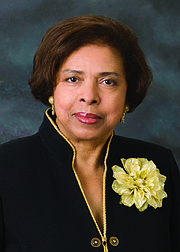The postponed and rescheduled 2020 Olympic Games are only a few weeks away. If the Japanese and International Olympic committees can manage a COVID-safe environment, I welcome them. I consider this event to be one of the purest forms of athletic competition. Participants train and compete fairly in a test of physical prowess.
If you will, imagine yourself as a participant in the finals of the 100-meter dash. When you arrive at the starting area, you find the starting block in your lane 18 meters behind those of your competitors. The race begins with little to no hope of you overcoming the disadvantage imposed upon you.
In real life, that is the type of disadvantage imposed upon the average American woman. PayScale, a compensation research organization, asserts that in 2021, the average American woman earns 82 cents for every dollar earned by the average American male, or 18 cents less!
To raise awareness of this disparity, Equal Pay Day is observed. It is the day to which the average woman must work in a new year to achieve earning parity with the average male’s earnings for the past year. In 2021, Equal Pay Day was March 24. This date is calculated without regard to experience or job type.
The gender pay gap has long been the subject of contention and debate. Few will debate its existence, but there is significant disagreement as to the cause. Some will argue that the career-related choices of women and the stereotypical obligations of “womanhood”— homemaker, wife and motherhood — reduce their “time on the clock” and, therefore, their resulting income.
Others contend that, historically and contemporarily, the work and performance of women has been undervalued, and, among other reasons, employers have routinely practiced the payment of lower wages in women-dominated career fields. I support this latter position.
Despite the Equal Pay Act of 1963, women throughout their careers continue to earn less than men, and this disparity occurs as early as one year out of college. Christianne M. Corbett, a senior researcher at the American Association of University Women, co-authored a study titled “Graduating to a Pay Gap.” For college graduates, the research demonstrated that after factoring variables such as college major, occupation, and number of hours worked, women’s pay was 82 percent of their male counterparts’ pay one year after graduation. In this study, on average, men earned nearly $8,000 more than women one year after graduating.
Unfortunately, these “averages” do not reflect the pay disparities that are inherent when factoring in racial and ethnic differences. According to PayScale, women of color fall victim to an even greater gender pay gap. One does not have to be an Einstein to understand the impact of this pay disparity on single mothers and double-income families.
If circumstances were not bad enough, COVID-19 has had a disparate, negative impact on women. Almost daily, we learn from the media that the greatest impact of this pandemic has been on women and it’s not difficult to understand that those starting farther back in the race suffer the most.
A review of the facts of this systemic discrimination are instructional, but information alone cannot effect change. As with any other form of discrimination, change can only occur with major impetus initiated by the discriminator or those with the power to direct necessary change. In this case, employers must assess and monitor their policies and practices to assure compliance with genuine anti-discrimination goals.
In the absence of enlightenment by employers, legislators must be open to the review and modernization of existing laws and policies. Both must work to increase transparency in compensation practices for the identification and remedy of disparities.
Lives depend on it!
The writer is president of the National Congress of Black Women.
"pay" - Google News
June 18, 2021 at 05:00AM
https://ift.tt/3wGAgNs
The gender pay gap by Dr. E. Faye Williams - Richmond Free Press
"pay" - Google News
https://ift.tt/301s6zB
Bagikan Berita Ini















0 Response to "The gender pay gap by Dr. E. Faye Williams - Richmond Free Press"
Post a Comment